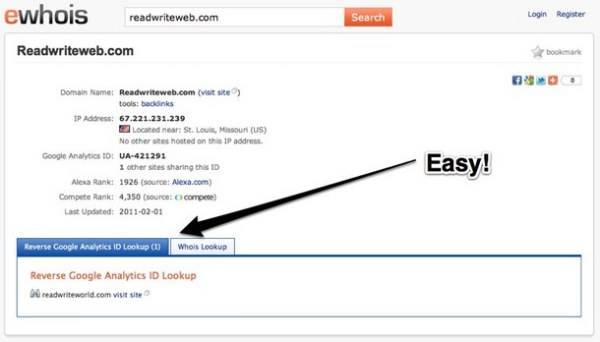It’s no exaggeration to say that, sometimes, anonymity is a matter of life and death. Which is why it’s important to know just how trivial it is to track down an “anonymous” blogger using their Google Analytics code.

Andy Baio, who runs the popular linkblog Waxy.org posted Wednesday about using simple tools like eWhois and Statsie to unmask several bloggers.
Baio says that tracking down a blogger by GA is less likely than by IP address or another slip-up, but “it’s also more accurate. Hundreds or thousands of people can share an IP address on a single server and domain information can be faked, but a shared Google Analytics is solid evidence that both sites are run by the same person.”
How He Did It
You’d think that this would take some serious sleuthing techniques right? Well, thinking of tracking bloggers using their GA code seems some hoopy thinking – but the method isn’t hard.
Basically, Baio plugged the anonymous domains into eWhois:
Using a sample of 50 anonymous blogs pulled from discussion forums and Google news, only 14 were using Google Analytics, much less than the average. Half of those, about 15% of the total, were sharing an analytics ID with one or more other domains.
In about 30 minutes of searching, using only Google and eWhois, I was able to discover the identities of seven of the anonymous or pseudonymous bloggers, and in two cases, their employers. One blog about Anonymous’ hacking operations could easily be tracked to the founder’s consulting firm, while another tracking Mexican cartels was tied to a second domain with the name and address of a San Diego man.

The good news is that Baio contacted the bloggers to alert them. The bad news is that a lot more bloggers out there probably think they’re anonymous and untraceable when they’re really not. The good news is this technique might be very useful in tracking astroturfing and advocacy backed by companies trying to hide their influence.
Alternative to Google Analytics: Piwik
If you are trying to remain anonymous for some reason, and have a hankering to see your stats, you might consider using an alternative to Google Analytics. One of the best tools that gives you total control of your own data is Piwik.
Piwik is very comprehensive, if not an exact drop-in replacement for GA. It also works well with blogging platforms like WordPress, so you don’t have to sacrifice much in the way of convenience. The big trade-off is that you have to host your own instance of Piwik if you want true anonymity. However, this is a piece of cake. If you can set up WordPress, you can set up Piwik.
The upsides of Piwik, though, are many. First, you’re in control of your own data. Secondly, its plugin system allows it to be extended, which means that Piwik can do things Google Analytics does not.
Be Careful Out There
While I’m a big supporter of people’s rights to be anonymous or pseudonymous online, it’s worth pointing out that it’s very unwise to assume you actually are untraceable. That is to say, it may be a very bad idea to say or do some things online even if using a pseudonym or attempting to be anonymous.
If you are trying to be anonymous online, Baio suggests Global Voices Online’s guide to anonymous blogging with WordPress and Tor. He also has several recommendations on his post, such as using domain privacy with your registrar. Be careful out there.

















